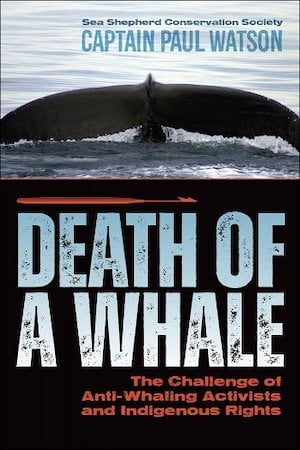Few people have done as much to protect whales and the waters they live in than Paul Watson. Founder of the Sea Shepherd Society, Watson has devoted a lifetime to quite literally going head-to-head with whalers in oceans around the world.
Watson is also a powerful writer, with numerous books to his name over the years, including two that were published recently and worth checking out.

In Death of a Whale, Watson completes a book he began writing nearly two decades ago, the story of the killing of a young grey whale in Neah Bay in the State of Washington in 1999 by members of the Makah Tribe.
Watson and the Sea Shepherd Society fought to protect the whale, beginning in meetings of the International Whaling Commission (IWC) and ending tragically on the shores of Washington.
The issue of indigenous rights to kill whales is one fraught with conflict: cultural, political and geopolitical. Watson emphasizes the role Japan played in soliciting indigenous tribes around the world to pursue whaling, to assist Japan in its efforts in flouting the ban on whale killing.
Watson found himself labeled by many as culturally insensitive, even racist, which he denied, writing:
I have always been a strong and active advocate of Aboriginal Indigenous rights. I am, however, also a wildlife conservationist, and occasionally my advocacy for wildlife brings me into conflict with many different cultures, ethnic groups, and nationalities. My priority is always the interest of wildlife and endangered and threatened species over the interests and demands of humans, any group of humans, without discrimination.
While these issues are indeed complex, if you look at the world through the eyes of an animal, any animal, clarity is much easier to find. Watson keeps his focus on the life of this young whale while navigating the political, financial and cultural obstacles created by humans. Sadly, the Makah Tribe recently won a legal battle to resume whaling.
And though there is no happy ending to this story, Watson’s story is one of determination, courage and compassion. The book is a passionate and well-documented testament to a fight, to a moment in history, and, ultimately, to a young grey whale who died at the hands of man.

Urgent! Save Our Ocean to Survive Climate Change is a 78-page call to action, and one that should be widely disseminated and read. What I love about the book is how personal it is; Watson shares his journey to animal and ocean activism and how a face-to-face encounter with a sperm whale changed his life. The whale was being hunted by the Soviet fleet for oil, oil used not for lamps but for ballistic missiles. He writes about his transformation:
…I began to embrace biocentrism, which is the understanding that we all are part of everything, not the master of other species and certainly not the overlords of this planet that we think we are. Every bee, every tree, every worm, every tiny zooplankton and phytoplankton is working hard to maintain the ecological integrity of the planet, while we humans do little but entertain ourselves at the expense of all other species.
And he sheds light on the reasons why we continue to hunt down so-called predators such as wolves and mountain lions. Why we vilify sharks when they are the species most under threat of survival these days. It often comes down to a perceived need to control the world around us:
Most people are threatened by uncertainty and insecurity. Because of this, we have eradicated predators, exterminated wildlife and cut down forests.
Watson provides steps we can all take to make a difference in separate ways, as well as a practical list of tips for staying sane in a seemingly insane world. Such as fear is a poison; try not to let it seep into your life. This book, while small, is likely to make a big impact on anyone who reads it.
John is co-author, with Midge Raymond, of the Tasmanian mystery Devils Island. He is also author of the novels The Tourist Trail and Where Oceans Hide Their Dead. Co-founder of Ashland Creek Press and editor of Writing for Animals (also now a writing program).

